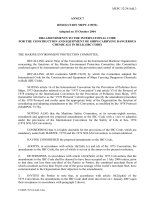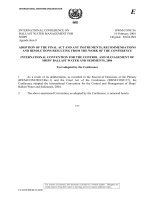The mind and face of bolshevism
Bạn đang xem bản rút gọn của tài liệu. Xem và tải ngay bản đầy đủ của tài liệu tại đây (11.13 MB, 396 trang )
Rene Fueloep Miller
ILLUSTRATED
THE MIND
AND FACE OF
BOLSHEVISM
*& «•*>•
An Examination of Cultural Life in
the Soviet Union
With a new Epilogue by the Author
LLLluiflUiMiLA^iiU
The Academy Library I IB 1188Q / $2.95
The Mind and Face
of Bolshevism
b^RPCR f UORCbBOORS
A reference-list of Harper Torchbooks, classified
by subjects, is printed at the end of this volume.
THE MASS
THE MIND AND FACE
OF BOLSHEVISM
An Examination of Cultural Life in
Soviet Russia
BY
RENE FUELOEP-MILLER
With a new Epilogue, "Changes in Soviet Life
and Culture During the Last Decades"
and a new Bibliography
(1962)
f
H A R P E R T O R C H B O O K S T T / K ? Academy
HARPER & ROW, PUBLISHERS, NEW YORK
Library
T H E M I N D AND FACE O F BOLSHEVISM
Epilogue and Bibliography to the Torchbook edition copyright © 1965
by Erika Fueloep-Miller.
Printed in the United States of America
This book was first published in German under the title Geist und
Gesicht des Bolschewismus in 1926 by Amalthea-Verlag, Zurich, Leipzig, and Vienna. It was translated by F. S. Flint and D. F. Tait and
published in the United States and England by G. P. Putnam's Sons,
Ltd., in 1927. It is here reprinted by arrangement.
All rights reserved. No part of this book may be used or reproduced
in any manner whatsoever without written permission except in the
case of brief quotations embodied in critical articles and reviews. For
information address Harper & Row, Publishers, Incorporated, 49 East
33rd Street, New York, N. Y. 10016.
First HARPER TORCHBOOK edition published 1965 by
Harper & Row, Publishers, Incorporated
New York, Evanston and London.
CONTENTS
CHAP.
PAGE
LIST OF ILLUSTRATIONS
vi
INTRODUCTION
ix
.
NOTE ON THE PRONUNCIATION OF RUSSIAN NAMES
I. T H E COLLECTIVE MAN
i
II. LENIN
27
III. T H E PHILOSOPHY OF BOLSHEVISM
.
.
.
IV. BOLSHEVISM IN THE LIGHT OF SECTARIANISM
V. T H E BOLSHEVIK MONUMENTAL STYLE .
.
.
50
.
.
. 7 1
.
89
VI. T H E PROPAGANDIST THEATRE
VII.
114
THEATRICALIZED LIFE
133
VIII. T H E MECHANIZING OF POETRY
IX.
152
BOLSHEVIK MUSIC
175
X. T H E REVOLUTIONIZING OF EVERYDAY LIFE
XI.
XII.
ILLITERACY AND THE NEW EDUCATION .
.
.
.
.
.185
.
T H E REFORMATION OF THE BYZANTINE CHURCH .
.
.
.
XIV.
.
.
.
T H E KATORGA—THEN
AND NOW
.
223
.
XIII. T H E REBIRTH OF RUSSIAN MYSTICISM .
XV.
xiii
244
255
265
T H E ETHICS OF BOLSHEVISM
277
EPILOGUE. DOSTOEVSKI'S VISION OF BOLSHEVISM .
.
Epilogue to the Torchbook edition: Changes in
Soviet Life and Culture during the last decades.
. 291
289
Bibliography (December, 1962)
.
.
.
.
285
326
Bibliography
331
Index
341
LIST OF I L L U S T R A T I O N S
Frontispiece:
THE MASS
(The following
illustrations will be found in a group
following page 212.,)
i . THE GIANT TOYS OF THE COLLECTIVE M A N : figures of Lloyd George, Mil-
lerand, Kerenski and Milinkov in front of the Kremlin.
2. Moscow: The "Red Square" before the Historical Museum, decorated.
3. THE MECHANIZED INDIVIDUAL IS REDUCED TO A MERE COMPONENT PART IN
THE MASS WHICH HAS BECOME THE MACHINE. (Constructivistic-symbolical
drawing by Krinski).
4. "LET US TAKE THE STORM OF THE REVOLUTION IN SOVIET RUSSIA, UNITE IT
TO THE PULSE OF AMERICAN LIFE, AND DO OUR WORK LIKE A CHRONOMETER!"
(Gastev's appeal for Americanization).
5. A TEMPLE OF THE MACHINE-WORSHIPPERS : A Byzantine Dome. Instead of
angels, figures of Communist agitators have been placed in the spandrels
(Drawing by Krinski).
6. PLAN FOR A MONUMENT TO THE COMMUNIST REVOLUTION: "THE COLOSSUS
OF IRON."
7. LENIN SPEAKING FROM A PLATFORM ON THE MOSCOW THEATRE SQUARE.
8. LENIN IN HIS STUDY.
9. LENIN, BUKHARIN AND ZINOV'EV, THE FOUNDERS OF "BOLSHEVIK MARXISM."
10. FESTIVAL TO CELEBRATE THE FRATERNISATION BETWEEN WORKERS, PEASANTS
AND SOLDIERS.
11. THE "CENTRAL EXECUTIVE OF ALL THE RUSSIAN PROLETARIAT" HOLDS A
SESSION IN THE FORMER CORONATION ROOM OF THE MOSCOW KREMLIN.
12. TROTSKI IN HIS STUDY.
13. LEADERS OF SOVIET RUSSIA: Sokolnikov, Fiatakov, Bukharin, Kamenev,
Kurski.
1 4 . LENIN'S FUNERAL.
1 5 . STALIN AND KALININ.
1 6 . PROPAGANDA CHINA PLATE FROM THE FORMER IMPERIAL FACTORY.
17. "SUPREMATIST" POTTERY FROM THE FORMER IMPERIAL POTTERY FACTORY.
18. BOLSHEVIK "ISMS."
19. ARCHITECTURAL MODEL (by Ladovski).
20. I N A "RED WORKERS' CLUB." Performance of a play by Mayerhold, in which
the political questions of the day are discussed.
21. STANiSLAVSKi, TAIROV, CHEKHOV (a nephew of the writer), AND EVREINOV.
22. THE "CONSTRUCTIVIST" STAGE IN THE MAYERHOLD THEATRE.
vi
Illustrations
vii
23.
A GROUP FROM A PROLETARIAN PROCESSION.
24.
T H E S T O R M I N G OF T H E K R E M L I N ( d r a w i n g b y K r i n s k i ) .
2 5 . LENIN ADDRESSES THE CROWD FROM THE FACTORY CHIMNEYS ( d r a w i n g b y
Deni).
2 6 . PART OF A GREAT PROCESSION OF INDUSTRY.
27.
A WALKING EXHIBITION OF THE BOOK TRADE DURING AN INDUSTRIAL FESTIVAL.
28. " T H E M A S S O N T H E M A R C H . " ( R a d e k , p a i n t i n g b y K u p k a ) .
29. GREAT SOVIET GYMNASTIC DISPLAY.
30.
BIRD'S EYE VIEW OF THE WINTER PALACE WITH THE ALEXANDER COLUMN.
3 1 . THE "THEATRICALISED" STORMING OF THE WINTER PALACE.
32.
P O R T R A I T OF GORKI ( b y I . A n n e n k o v ) .
33.
P O R T R A I T OF S A M I A T I N ( b y I . A n n e n k o v ) ;
3 4 & 3 5 . CONCERT OF FACTORY SIRENS AND STEAM WHISTLES.
36.
T H E P R I V A T E C H A P E L O F T H E " T R O I T S K O E P O D V O R E " ( C h u r c h of t h e T r i n i t y )
TRANSFORMED INTO AN ATHEIST'S CLUB.
37.
THE CUPOLA OF A LENINGRAD CHURCH.
38.
A COMMUNIST SPEAKER AMONG THE PEASANTS.
39.
A COMMUNIST PARTY CONFERENCE.
40.
INDESTRUCTIBLE SUPERSTITION IN RUSSIA.
4 1 . COMMUNISTIC UNIVERSITY OF THE WESTERN PEOPLES IN MOSCOW READING
ROOM.
42.
A YOUNG HOUSEKEEPER, BEFORE SHOPPING, GOES WITH HER A B C TO THE
SCHOOL FOR ILLITERATES.
43.
SCHOOL FOR ILLITERATES.
4 4 . EXTERIOR OF THE "CENTRAL INSTITUTE FOR SCIENTIFIC RESEARCH INTO
HUMAN LABOUR" (GASTEV INSTITUTE).
4 5 . CINE-PHOTOGRAPHY OF THE LABOUR PROCESS.
46.
THE USPENSKI CATHEDRAL.
47.
I N A L E X E I TOLSTOI'S H O M E :
( f r o m left t o r i g h t )
TIKHONOV,
SCHIPATCHEV,
TOLSTOI, TVARDOVSKY, ISAKOVSKY, SURKOV.
48.
ILYA EHRENBURG ADDRESSING THE PEACE RALLY IN LONDON'S TRAFALGAR
SQUARE, I9SO.
49.
BORIS PASTERNAK AFTER HEARING OF HIS WINNING THE 1 9 5 8 NOBEL PRIZE
IN LITERATURE FOR Dr. ZktVOgO.
50. POET E. YEVTUSHENKO, 1 9 6 2 .
5 1 . FORMER PREMIER KHRUSHCHEV AT TWO DAY MEETING IN KREMLIN'S SVERDLOVSK H A L L , W I T H ( f r o m left t o r i g h t ) F R O L KOSLOV, K H R U S H C H E V , S . M I K -
HALKOV, GEORGI CHUKHRAY AND PYRIEV.
5 2 . WOODCUT OF VLADIMIR MAIAKOVSKI BY YURI MOGILEVSKY.
INTRODUCTION
H
ITHERTO Bolshevism has almost always been regarded
purely as a political problem; to wrest it from this misleading and superficial judgment is the aim of this book. For
what is happening in Russia to-day is far too significant and fateful
for our age to be handed over for acceptance or rejection to a caste
of politicians whose attitude and verdict depend entirely on tactical
considerations, and who will emphasize or ignore both its defects
and its merits as it suits their interest at the moment.
The problem of Bolshevism extends far beyond the narrow
horizon of political sympathies or antipathies. Its acceptance or
rejection is the rej'ection or acceptance of the whole of European
culture. The claim made for Bolshevism is that it can immediately
and without delay realize all the immemorial aims of human endeavour, all those things for which the thinkers of all times have
striven, to which martyrs have testified by their example in life and
in death—I mean, the redemption and happiness of mankind. Its
doctrines offer not the vague hope of consolation in another and
better world of the future, but precepts for the immediate and
concrete realization of this better world.
Such a colossal claim demands more earnest consideration than
is generally accorded to political and social reforms; but it also calls
for more serious and conscientious criticism. No body of men has
ever before had the audacity to try to " give a practical demonstration " of redemption, that never yet attained vision of the future;
and no one who enters upon so bold an undertaking can expect to
escape rigorous criticism.
The ordinary methods of objective criticism break down before
the vastness of the subject, and it cannot be exhausted by political
and economic abstractions. Bolshevism stands for a radical change
of the whole of human life in all its fundamental aims and interests,
in every one of its manifestations. But you cannot get to the heart
of reality by impersonal theories, a dry array of facts, and an uncritical
reproduction of expressions of opinion, pro and con. Only by
experience can you obtain a truthful picture of men and their actions,
x
The Mind and Face of Bolshevism
words and ideas, and only a concrete representation of what has
been experienced can communicate to others a true picture of living
reality.
By objectivity, I mean a sincere way of looking at things, a lack
of bias in personal impressions, an impartial attitude to what is seen
and heard, so that what is really great will be recognized as great
even when it alienates and wounds, and what is mere sham and
pretentiousness is ridiculed, however emotional its appeal. To be
objective is not to abstain from any critical estimate, but rather to
approach life without prejudice and to form a just judgment on it.
In any attempt to give a vivid and faithful picture of present-day
Russia, it is necessary to invoke the aid of photography, an important
ally. Its unerring reliability serves as documentary support to the
text; it preserves for all time the whole world of Bolshevism: the
daily life of the period, its great festivals, its works of art, and its
men and women. Much of what is fixed on the plates is unique and
can never happen again; in all its extraordinanness it is already a
part of history. In this sense, many of the illustrations in this book
can be regarded as priceless historical documents.
Where necessary to illustrate personal experience, I have quoted
from the speeches, writings, and other utterances of the friends and
foes of Bolshevism; but only persons have been unreservedly
allowed to speak whose statements had been verified by ocular
evidence. On the other hand, the empty talk of phrase makers has
been ruthlessly exposed.
The limits of objective criticism are laid down automatically by
the nature of every historical process; in the criticism of Bolshevism,
however, these restrictions are even more clearly felt. We are
dealing here with a revolution which maintains that with it and
through it the old world ceases and a new humanity begins. But
the dominance of this system, the effects of which will extend to the
most distant future, will have lasted barely ten years when this book
is published.
Can any fair estimate be made, after such a brief experience, of a
principle whose consequences may endure for thousands of years ?
Yes and no: it is true that it is not at present possible to draw a final
picture of the nature and prospects of Bolshevism, since many
beginnings will be dropped and much that is new will be added.
Nevertheless, it is already possible to give expression to much that
is important regarding the mind and face of Bolshevism, for a
section of a curve often permits us to draw weighty conclusions
about its further course.
While this book, therefore, does not presume to give a final
verdict on events in Russia, it does, by the manner of its treatment,
claim to save Bolshevism from a narrow, utilitarian, political
Introduction
xi
criticism, and to show it in its true light as a momentous problem of
civilization as a whole.
I have to express my very grateful thanks to all the Russian
artists, politicians, and scholars who so unselfishly aided me in my
work in Russia. I must also acknowledge that the authorities put no
check on my activities, although my attitude was entirely unbiassed,
open, and critical. Finally, special thanks are due to my friend,
Percy Eckstein, for his valuable assistance in the completion of my
book.
RENE FULOP-MILLER.
VIENNA, April 1926.
NOTE ON THE PRONUNCIATION OF
RUSSIAN NAMES
No Englishman can hope to pronounce Russian correctly without
tuition from a native teacher. The following hints on the pronunciation of the Russian names in this book are, therefore, offered only as
rough approximations:
a
e
e
6
i
= ah
= yeh or eh
= yaw or aw
= eh
= ee or yee
0
= aw (or a)
u = oo
ia = yah
iia = ee-yah
ie = ee-yeh
ii = ee or yee
iu = you
y l = y in pity
= g in get
g
s
= s in sat
V
= f at the end of words (elsewhere, as in vat)
kh = ch in loch
zh = s in pleasure (French j)
ch = ch in chat
sh = sh in ship
shchi = shch in nsh chezp
ts = ts in cats
All other consonants as in English.
The apostrophe after a consonant in or at the end of a Russian
word denotes the Russian soft sign. It modifies both the preceding
consonant and vowel. It sounds rather like a light y (as in you).
As examples, Turgenev is pronounced Toor-gheh-nyef; Sergeev
= Ssair-gheh-yef; H'in = Eelyin; etc.
Translators.
1
Used to transliterate the Russian letter try, for which vowel there is no
equivalent in English.
Chapter I
THE COLLECTIVE MAN
A
N old folk legend, which was current among the Russian
peasants long Defore the Revolution, announces the advent of
a time when the " nameless beast" would succeed to the
sovereignty of Russia, a beast which is nameless because it will be
composed of the innumerable many. Now it is here, the " nameless
beast," and has set up its kingdom: the impersonal mass is lord of
Russia; it is the most important new phenomenon which Bolshevism
has produced, a reality which no one can disregard. Whether, like
some monstrous creature of fable, it rolls through the streets of the
great cities, now growling happily, now roaring with rage, or whether
it lies down comfortably on one of the wide squares to enjoy, like an
animal, the sun, life, and its own exuberant strength—the many
thousand isolated personalities of which it is composed disappear,
and we no longer recognize the simple worker in his workaday
blouse, the soldier, the typist, the student, or the navvy. A mighty
and powerful organism has absorbed them all into itself, and a single
rumbling voice, incomprehensible and terrifying as the roar of the
elements, has swallowed up all their individual cries, their joyful or
angry words.
Anyone who is able to keep himself outside this mass, a foreigner,
or an unorganized individual, perhaps retains the feeling that, here,
too, it is human beings with whom he has to deal; but, at the same
time, he dimly divines the new entity in this transformation to mass.
For the voice that comes from its human throats is strange, and
strange, too, the movements of the titanic, many-membered body.
The individual feels it as a new and hostile phenomenon; he feels
that the monster is sparing him to-day only, sooner or later, to
destroy him with infallible certainty. But those, however, who firmly
believe in the Revolution proclaim with ecstatic rapture that this
sinister-seeming being is the great achievement of the century, the
" new man " ; such will be the aspect of that creature of the future
which is called upon to take the place of the individual, and, from
now on, to reign in his stead.
2
The Mind and Face of Bolshevism
Awe-inspiring and in mighty pre-eminence, the mass confronts
the individual, for it possesses the " multiple strength " of organization. It, too, once consisted of many helpless individuals, all seemingly abandoned to their blind " anarchical " fate; but now, united
into mass, they stand forth powerful and feared; the secret of their
strength is organization; there lies hidden the new salvation by
which man may become master of life.
Only in Russia has the final secret of this one possible salvation
been recognized, i.e., that it is not so much the development of the
soul that can lead humanity to a true re-birth, but that the end is
rather to be reached through the mechanical, external, and purely
cumulative combination of all individuals by means of organization.
It is only by such external functions as the millions have in
common, their uniform and simultaneous movements, that the many
can be united in a higher unity: marching, keeping in step, shouting
" hurrah " in unison, festal singing in chorus, united attacks on the
enemy, these are the manifestations of life which are to give birth
to the new and superior type of humanity. Everything that divides
the many from each other, that fosters the illusion of the individual
importance of man, especially the " soul," hinders this higher
evolution, and must consequently be destroyed. The " glorious
external man " is henceforward to take the place of the inner man,
organization is to be substituted for the soul. For only the mechanically organized has reality, strength, and permanence, mechanism
alone is reliable; only the " collective man," freed from the evil of
the soul, mechanically united by external interests with all others,
is strong. To him alone belongs the empire of the future; only he
will be able to reign therein " i n the millenium."
But the unorganized individual, full of his personal cares, still
sick with the vague mystery of the " soul," with that evil handed
down from an accursed individualistic past, will be unable, on
account of this soul, to find a place in the empire of the future.
Strange must seem this meeting on the brink of time: here, on
the one side, is still the individual, who to-morrow perhaps will be
only a ghost from an epoch which has been won through, while
there, only a few paces away and yet on the farther side of the gulf,
stands already that superior new being elected to succeed the
individual. The older man may see and grasp how the wonderful
creature looks, and wherein it differs from himself and his kind.
But for the moment, at any rate, this mass entity produced by
organization may only be recognized in its most primitive manifestations : wherever the " collective man " is seen, on the streets
engaged in a demonstration, at festivals displaying a vociferous
vitality, he at once gives the impression of a creature of the primitive
world; his gigantic body is awkward, uncouth, and unwieldy; he
The Collective Man
3
rolls through the streets stamping with heavy tread; he surges up
like an enormous wave, and bellows and roars like a great prehistoric
monster. And, like a prehistoric beast, he rejoices in his fearsome
elemental howls; he relishes the joy which all living things feel in
the animal working of their vital functions. The collective man is at
present living in his primeval state, exercising himself in the most
primitive motions in action and speech, which were also the first
steps in the development of the individual man.
The First of May is his festival, his birthday, as it were, when his
naive character is most clearly in evidence. The " Red Square,"
with the magnificent " rows of shops," and the wall of the Kremlin
are then richly decked with flowers and pine branches, and hung
with many flags and streamers. In the middle of the Square stand
toys of various kinds, his birthday presents, gigantic dolls, trains,
engines, and boilers made of papier-mache. Excited and delighted,
the collective man stumps about with his thousand legs and shouts
"Hurrah! hurrah!" from his thousand throats. Sometimes he
stops suddenly, looks round, considers one by one the enormous
figures made of cardboard or cloth stuffed with straw; all at once
he notices that the dolls have the faces of foreign statesmen and
capitalists, that is to say, of people against whom he has a grudge at
the moment. In a mad rage, he hurls himself against them, furiously
tears out their stuffing, holds them in his many outstretched hands,
and gloats in the intoxication of victory. Often the figures are
hanged on a rope; the raging " mass " sticks a long tongue of red
ribbon in their mouths, or burns them ceremoniously. All this is
done with the naive cruelty of savages or children, with the primitive
joy in smashing toys which is natural to both. Like a child, the
collective man, in his games, avenges himself on all his enemies. He
amuses himself in this way on the Red Square till late in the evening;
if he finally gets tired, the megaphone from the platform above
sounds the signal for " closing," and the mass man goes off and lies
down obediently to sleep in his ten thousand beds.
But he is not always so good-humoured. If anyone attempts to
doubt his power, at once he breaks into desperate fury, and there
is no longer anything of childish glee about him. The mere sight
of him spreads terror and fear. Suddenly, in the course of a few
moments, he towers above the sea of houses, like a black, manyheaded, gigantic beast, takes up a threatening stand before the Great
Theatre, and remains motionless and waiting, ready to spring at any
moment. At such times, the thousands of individual entities are
nothing but a great giant body crouched in mad rage, a single mighty
movement, a single sinister shriek from countless throats.
For it is only in his rage that the collective man shows his
strength; a fight is the element in which his real nature is most
4
The Mind and Face of Bolshevism
strongly in evidence. And this is a sure proof of the primitive state
in which he still is, for it is exactly the attitude of prehistoric man to
the outer world.
It is difficult to draw any conclusions about his later development from these first manifestations of the collective man. He
rejoices in play, in sunshine, in the untrammelled use of his throat
and limbs, in gaily decorated squares and rows of houses; he is
capable of resistance, terrible in anger, and proves himself in attack.
But instinctively we ask ourselves whether this " mass man " gives
any promise of rising above organized prowling and growling, above
attacks, and of becoming a superior being, whether he is really
destined to contribute new values to history. At present, seeing him
still in the first stages of his development, we look in vain for that
" collective mechanism " which, according to Bolshevist affirmations, is gloriously to replace the slaughtered individual soul; we
can find very little trace of the constructive, creative capacities which
alone can furnish the criterion of its historical vocation.
The dissolution and destruction of the " soul-encumbered " man
of the past is not yet completed in Soviet Russia; the collective man
is still actually to be seen only at festivals, at demonstrations, on the
Red Square, on the streets, or at meetings in the great factory halls;
in lonely homes, on the endless Sarmatian steppes, in the recesses of
many Russian hearts the persecuted old man still lives on in secret;
on the other hand, the visible authority over town and country,
over the whole Russian realm, is solely and wholly in the hands of
the " organized mass." The face and form of the new Russia, the
pulse and rhythm of life, are determined not by those who stand
aside cherishing in their heart the old man, numerous though they
be, but by those who, out on the street, on the Red Square, or in the
factory halls, stand organized in one mighty mass.
Everything that happens in Russia to-day happens for the sake
of the mass; every action is subordinated to it. Art, literature,
music, and philosophy serve only to extol its impersonal splendour,
and, gradually, on all sides everything is being transformed to the
new world of the " mass man " who is the sole ruler.
A fundamental upheaval has thus begun, and there can be no
doubt that a new era is coming to birth. For what has been enacted
in Russia is in truth more than a revolution in the ordinary meaning
of the word: we have to deal with something more important than
a mere modification of social and political conditions, or of the social
position of a few classes of the population. The revolution has
touched the ultimate problems of mankind. With unheard-of bold-
The Collective Man
5
ness, an attempt is being made in Russia to make a correction in the
archetype of humanity itself, to wipe out the former t pe of the lord
of creation, that " soul-encumbered individual creature," and to
replace it by a " higher type," by what is believed to be a new and
more valuable species of living being, by the " collective man," to
replace the individual by the ' dividual."
This ardent striving after the " mass man " arose in Russia at a
moment when Western Europe was coming more and more to
recognize the modern scientific theory that mass psychology is
nothing but the reassertion of the old instincts of the primeval horde,
a return, a " regression " of the human soul to the conditions of a
prehistoric, primitive stage of development, which culture long ago
surmounted, but which is still to be found occasionally, even now,
among savage races. Le Bon first expressed the view that the
individual acquisitions of the person were completely obliterated in
the absorption into the mass, that then all the values which the
isolated personality had built up for itself disappeared, so that thereafter only the unconscious racial heritage remains, and the heterogeneous is submerged in the homogeneous. The main characteristics of the individual existing in the mass are, therefore, a disappearance of conscious personality, and a predominance of the
unconscious; the individual is no more himself, he has rather
become " an automaton with no will of his own." In Le Bon's
judgment, man, by adherence to a mass, descends in the scale of
civilization; although, in his isolation, he was perhaps a cultivated
individual, once merged in the mass, he will become a barbarous
creature of instinct; he will acquire the spontaneity, the impetuosity,
the indiscriminating enthusiasm and heroism of primitive peoples.
The same view of the psychological deterioration of the individual
man through absorption in the mass is also put forward by Siegmund
Freud in his Massenpsychologie und Ich-Analyse. He, too, sees in the
mass the decline of individual initiative, a reciprocal levelling of the
most valuable qualities of the individual in favour of the joint mass
reaction, and, therefore, a retrogression to primitive psychological
conditions.
In contrast to the views of these Western European investigators,
the Bolshevists find in the complete absorption of all individuals in a
million-headed impersonal mass, the ideal of all development, for
which they must strive with all their strength. T h e ' ' collective man "
means to them a " superior category," a higher, more valuable form
of organization of existence, the realization of which is worth any
sacrifice. The poets of Bolshevism extol with apocalyptic rapture
the coming empire of the mass man; thus the folk bard, Dem'ian
Bednyi, proclaims in winged verses the conquest of the world by
the new being:
6
The Mind and Face of Bolshevism
" Million-footed: a body. The pavement cracks.
A million mass: one heart, one will, one tread!
Keeping step! Keeping step 1
On they march. On they march.
March, march . . .
Out of the factory quarters, smoke-wreathed,
Out of black dungeons, filthy rat holes,
He came—his fingers bent like pincers,
Burst the thousand year old chains rattling about him—
Came now the new ruler on to the street.
Like flecks of blood
Crimson flags waved above him. Steel-hard fists
Are raised aloft. The bones of the bourgeoisie whine.
But he speaks:
' All this is mine!
Streets, palaces, canals, the Exchange, the Bank,
Arcades, granaries, gold, materials, food and drink,
Libraries, theatres, museums,
Pleasure grounds, boulevards, gardens and avenues,
Marble and the splendour of bronze,
The poet's poem and the singer's song,
Towers, ships, cathedrals, space all around,
All this is mine!'
The houses thunder back. The highway clamours.
The giant stands fast."
But even the sober and professionally unimaginative historians
and sociologists of Bolshevism write of this " higher collective
being " in a tone of credulity which is in no way behind the dithyrambic outbursts of the Soviet poets. They, too, see a higher being
in the impersonal mass, into which the whole of the still differentiated society of individual personalities is to be transformed, and
they, too, are of opinion that the dissolution of all individuals in the
" mass man " must be the ultimate and highest goal of all endeavour.
It is clear that in such a dogmatic negation of every kind of
individual separate existence, no exception could be made even for
the " commanding personality." Its unique importance, humbly
recognized by the bourgeois world, has been unmasked as a fiction,
and at the same time it had to be proved that the achievements of
many individuals, however outstanding they might be, had no claim
to personal character, since they too were nothing but a mere product
of collective conditions, or, as Bukharin expressed it, " as it were a
coagulated mass of compressed and tightly interwoven social
influences." The rigid fanaticism with which the Bolshevist ideologues defend their theory that the collective-impersonal alone is
The Collective Man
7
real and the separate existence of the single individual an illusion, is
most clearly evidenced by the fact that the notion received no check
even before Lenin, that truly unique personality who, by his very
individual achievement, was the chief creator of Bolshevism. When
Pokrovski, the great historian of Soviet Russia, wanted to describe
for the proletarian masses the significance of Lenin for the revolutionary development of humanity, he explained the Communist
conception of the phenomenon ' Lenin " in words which sound
utterly fantastic to Western ideas: " W e Marxians do not see
personality as the maker of history, for to us personality is only the
instrument with which history works. Perhaps a time will come
when these instruments will be artificially constructed, as to-day we
make our electrical accumulators. But we have not yet progressed
so far; for the moment, these instruments through which history
comes into being, these accumulators of the social process, are still
begotten and born in an entirely elemental way."
Once the primacy of collectivism had been so decisively settled,
and the creation of the impersonal mass-man had been decreed to be
the highest aim of the Bolshevik revolutionary upheaval, everything
that stood in the way of the coming of this new " collective man
had forthwith to be fought with all weapons. Naturally, it was first
the turn of the soul, the root of all particular life, which had to be
mercilessly exterminated. T h e ' ' soul-encumbered individual man "
must no longer be suffered to lead his pernicious separate life unchecked ; above all, for the sake of the future, he must be annihilated
in his premisses. These premisses include all particular ideas, all
conceptions, of whatever nature, of the importance of individuality,
of the possession of spiritual or material assets; of the value of
personal achievement and the struggle for an isolated inner development. But, further, all those precious cultural possessions accumulated by the individualism of past centuries, all the acquisitions of
personal thought, all the creations of individuals, must be sacrificed
without any " sentimentality," for they might hinder the arising of
the new collective man.
3
This passionate protest against the value and significance of the
individual personality, so hard for the Western European to understand, can only be explained by the specific cultural and intellectual
history of Russia. The Russian has never been able to perceive the
ultimate development of humanity except in a collective form, in a
conception of the collectivity, of the " people," into which even the
Russian idea of God has always been retransformed; God and
people have always been identical for the greatest Russian thinkers.
8
The Mind and Face of Bolshevism
This deification of the whole nation necessarily involved a disregard and finally a complete contempt for all personal values, and,
in the end, for individuality itself. Russia has from time immemorial been the country of the impersonal-collective idea. The
realization of this ideal was the aspiration of the Church, as well as
of all the sects opposed to the Church, and of all the intellectual,
cultural, and social currents, however they might differ from each
other.
May it not be that this singular exaggeration of the value of the
collective as opposed to the individual, peculiar to the Russian, this
strange cast of thought, so alien to the West, has ultimately its root
in the institution of serfdom, the century-long, complete oppression
of great masses of the people, and with the view of the serf people
as the impotent possession of a single master ?
In his book, Russian History and Philosophy of Religion, which has
become famous, Th. G. Masaryk makes the following statements
with regard to serfdom in Russia: " It is almost impossible to-day
for anyone to form even a faint image of Russian serfdom; even
those who know the history of the institution, usually realize only the
legal and economic aspect. But we must grasp its moral and social
significance in its vital concreteness, the fact that the peasant was in
bondage, body and soul, that the master could sell his serfs, that,
up to the year 1833, the family of a serf could, at the master's
pleasure, be broken up by the sale of one of its members as surely as
it could be broken up by death.... The serf was currency in barter;
the landowner staked his ' souls ' at cards; he could make a present
of them to his mistresses.... The picture of serfdom painted by the
best writers in their memoirs is a terrible one; anyone who reads
carefully the older Russian literature will discover everywhere this
moral and social background."
Only a people who had for so long been under the yoke of
despotic lords could find its highest ideal in a complete renunciation
of the individual will; Russia, after all, never took a real and vital
part in the great European intellectual development, which began
with the decay of the Middle Ages, and which, by way of the newly
discovered classical antiquity, and especially Platonism, rediscovered
the idealistic methods of the exact sciences, with the art and politics
intimately connected with them, and thus created an entirely new
world, and above all a new conception of the autonomous personality.
All that to-day we can call modern in the true sense of the word may
be traced back to this historical connection.
Russia, however, which, in the school of Byzantium, went other
ways, and, even in the geographical sense, gave Europe a wide berth,
remained completely alien to all this. The Russian never knew that
evolution from the stuffy narrowness of the Middle Ages to a free
The Collective Man
Q
universal humanity, which Europe experienced. It was not only the
mass of serfs who never succeeded in attaining to a free development
of their personality: serfdom in the same way corrupted the masters
too. Masaryk makes some observations also on this point, based on
Prince Kropotkin's memoirs:
" Kropotkin in his memoirs draws a poignant picture of the
moral effects of serfdom on the Russian aristocracy. In fact, with
every form and degree of slavery, we must consider not only the
effect on the slaves, but also on the slave-owners. Every form of
slavery is everywhere and always a double and two-fold thing—as
the master, so is the slave, as the slave, so is the master. Both are
slave souls, the slave and his master. Therein lies the curse of
slavery—a hierarchy of slaves, from the Tsar down to the last village
pasha, men who will not and cannot work because they are free to
use their fellow men as machines."
Even later, the man of the steppes could never get rid of the
stamp of everlasting bondage, oppression, and suffering, and when at
last in the 'sixties he attempted to free himself from the typical
Russian yoke, he could not pass beyond the nihilistic protest or the
individual. The Russian recognized personality only in such distortions as Dostoevski described in his " Underworldlings," rotten
with solipsism and impotent, or again in the groping efforts which
were to be noticed in Russian society before the Revolution. Maxim
Gorki has given an excellent description of that pitiful sham existence, that farce of individuality. But only in this way can it be
explained how even so important a thinker as he could arrive at the
strange view that the individual has, in general, no right to existence:
all the value of life must be credited solely and exclusively to the
collectivity, and the significance of personal achievement is altogether trifling, since the collectivity alone is the power which creates
all material values, and at the same time the source of everything
spiritual.
Since Gorki, too, recognizes personality only as a part of the
" true reality as represented by the mass," and allows it no rights
outside this relation, he sees in the development which personality
had taken in the Russian middle classes, the public proof of their
nullity and the cause of their well-earned overthrow. In his essay on
The Destruction of Personality, Gorki has described, in impressive
words, this gradual decay of individuality, which made itself felt
even before the Revolution. At the same time, thus early he proclaims that new vital power which is destined to replace personality,
the " collective man, only to be realized later by Bolshevism.
In the light of after events in Russia, it is doubly interesting to









